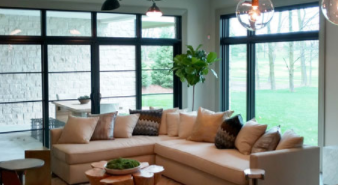Top Questions About Replacement Windows—Answered
Replacing your home’s windows is a significant investment that can enhance comfort, energy efficiency, and curb appeal. However, with numerous options and considerations, it's natural to have questions. Below, we address the most common queries homeowners have about window replacement.

1. When Should I Consider Replacing My Windows?
Windows typically have a lifespan of 15 to 20 years. Signs that it might be time for a replacement include:thespruce.com
- Drafts or Increased Energy Bills: If you notice drafts or a spike in heating and cooling costs, your windows may be losing their insulating capabilities.
- Difficulty Operating Windows: Windows that are hard to open, close, or lock can pose safety risks and indicate underlying issues.
- Condensation Between Panes: This suggests seal failure, reducing the window's efficiency.
- Visible Damage: Cracks, warping, or rot are clear indicators that replacement is necessary.
Regular inspections can help identify these issues early, ensuring timely replacements and maintaining home efficiency.
2. What Types of Replacement Windows Are Available?
There are several window styles to choose from, each offering unique benefits:
- Double-Hung Windows: Both sashes move vertically, allowing for versatile ventilation.
- Casement Windows: Hinged on the side and open outward, providing excellent airflow.
- Picture Windows: Fixed panes that offer expansive views and allow ample natural light.
- Sliding Windows: Move horizontally along a track, ideal for spaces with limited vertical clearance.
- Bay and Bow Windows: Extend outward from the home, creating additional interior space and panoramic views.
Choosing the right style depends on your home's architecture, ventilation needs, and personal preferences.
3. How Much Does Window Replacement Cost?
The cost of replacing windows varies based on several factors, including window type, material, size, and installation complexity.
Labor costs and additional features, such as energy-efficient coatings or custom designs, can also impact the total price.
4. What Materials Are Best for Replacement Windows?
The choice of window material affects durability, maintenance, insulation, and aesthetics:
- Vinyl: Affordable, low-maintenance, and energy-efficient.
- Wood: Offers a classic look with excellent insulation but requires regular upkeep.
- Fiberglass: Durable, energy-efficient, and withstands extreme temperatures.bhg.com
- Aluminum: Strong and lightweight but less insulating than other materials.
Consider your climate, budget, and desired aesthetics when selecting a material.
5. Should I Replace All Windows at Once?
While replacing all windows simultaneously can ensure uniformity and may be cost-effective, it's not always necessary. Prioritize windows that show signs of wear or inefficiency. Some homeowners opt for phased replacements, focusing on specific areas like the front facade or upper floors first.
6. How Long Does Window Installation Take?
The installation time depends on the number of windows and the complexity of the project. Typically, professionals can install 10 to 15 windows in a day. Custom or large-scale projects may take longer. Always consult with your contractor for a detailed timeline.
7. Can I Install Replacement Windows Myself?
While DIY window installation is possible for those with experience, it's generally recommended to hire professionals. Improper installation can lead to drafts, water leaks, and reduced energy efficiency. Professional installers ensure proper sealing, alignment, and adherence to local building codes.
8. What Are the Benefits of Energy-Efficient Windows?
Energy-efficient windows offer multiple advantages:
- Reduced Energy Bills: By minimizing heat transfer, these windows lower heating and cooling costs.
- Enhanced Comfort: Maintain consistent indoor temperatures year-round.
- UV Protection: Low-E coatings block harmful ultraviolet rays, protecting interiors from fading.
- Environmental Impact: Lower energy consumption reduces your carbon footprint.
Investing in energy-efficient windows can lead to long-term savings and increased home value.
9. Do I Need a Permit to Replace Windows?
Permit requirements vary by location. In many areas, replacing windows with similar models doesn't require a permit. However, if you're altering window sizes, changing the structure, or installing new openings, a permit may be necessary. Always check with your local building authority








